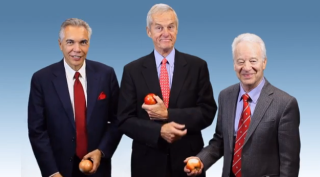"Food for Thought"
The year was 1982. "Food for Thought", a new and innovative course conceived by Drs. David Harpp, Joe Schwarcz & Ariel Fenster. Designed to provoke some thought, separate fact from fiction and of course, digest everything there is to know about food. And now, 15,000 students later, you too can take this course. FOR FREE. That's right. McGill presents its very-first MOOC (massive open online course), & the McGill Office for Science and Society (OSS) is up at bat. Are you ready for some Food for Thought? Click here to register. 
Updates
The MOOC is off and running! One of the topics we discussed in the first lecture is the addition of calcium propionate to bread. This is a preservative that inhibits the growth of mould. It is a useful additive because moulds can produce a variety of nasty toxins. Like any other approved food additive, calcium propionate has had to pass a variety of safety tests before being allowed on the market. In this case that was not particularly difficult because propionates occur in the human body in copious amounts as products of fat metabolism. Indeed, our underarm secretions contain propionates. Could that explain why in France where propionates are not used the tradition is to carry baguettes under the arm? Another topic addressed was the enormous sugar content of soft drinks. A 350 mL can contains about 9 teaspoons of sugar! That may be surprising to some, but perhaps not as surprising as the fact that an equivalent amount of orange or apple juice contains the same amount of sugar. There was also a discussion of how advertisers sometimes overstep the boundries by promoting a product, pomegranate juice for example, as possessing special health properties that have not been scientifically proven.
Introduction Video:

